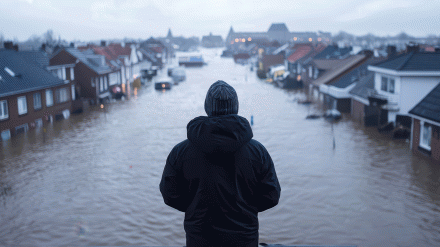“Good Samaritan” is a common term used to describe volunteers who go above and beyond to help after a disaster. There’s even a Good Samaritan law in every state to help protect uncompensated volunteers spontaneously providing aid in emergency situations.
The parable of the Good Samaritan, from which this term gets its name, is one of the most told and taught parables in the Bible. Found in the Gospel of Luke (Luke 10:25-37), it offers an example of how to love God, embrace strangers as neighbors, and help others in need.
A closer look at the Good Samaritan parable can provide inspiration and guidance for Christians seeking to help in the wake of disasters.
1. It’s not about you
Before volunteering, stop and ask yourself why you want to help. The telling of the Good Samaritan parable was sparked by an interaction Jesus had with an expert of the law. This expert wanted to know how to earn eternal life. Jesus redirected the conversation, shifting his thinking from “What’s in it for me?” to “How can I love God and others well?”
Help because of your faith, not to prove your faith.
Disaster relief is not about you. Volunteer to meet the needs of survivors, not to satisfy your own extrinsic needs (e.g., to be seen as a do-gooder). Make sure you are helping for the right reasons. Good reasons for wanting to help should be inwardly motivated: you want to help others for the sake of helping others. You want to help because you believe it’s the right thing to do.
2. Know your neighbor
Reach beyond your comfort zone; focus especially on helping underserved and vulnerable neighbors affected by hurricanes. Don’t cross to the other side of the road, like the priest or Levite, if you encounter someone in need whom you perceive to be different than yourself.
Disasters impact those with fewer social or economic resources more significantly. Because they have fewer resources at hand, it also makes recovery typically longer and more difficult.
Following the Good Samaritan’s example means broadening your notion of “neighbor” beyond shared geography and backgrounds.
You are called to show compassion to all people, regardless of religion, class, or difference—not just survivors you might easily identify with or relate to.
Reach out to help people living with major challenges: those in poverty, the medically fragile, the elderly, immigrants.
For example, some immigrants and refugees may live in fear of deportation, and as a result, they might not ask for the help they need to rebound.
Elderly people in high crime areas live in fear of being harmed and may not open their doors to people they don’t know, even if those people are trying to help them survive.
People living in poverty may not have the resources to evacuate and get to safety when that means paying for extra gas and a hotel.
3. Know how to love your neighbor
Empathize.
To love your neighbor in the wake of hurricanes, start by empathizing with what they are going through. When the Samaritan saw the injured man beaten by robbers, he connected with the man’s suffering. It’s common for disaster survivors to feel alone or isolated—like no one else understands their experience. Create space for them to lament what they have gone through.
Another way you can empathize with survivors is through prayer. As people of faith, we are called to pray for others, especially for those in need, and prayer is one of the most powerful ways we can help.
Meet basic needs.
The Good Samaritan took care of the man’s most immediate physical needs by bandaging his wounds, helping him to an inn, and taking care of him through the night.
Focus on attending to survivors’ most basic needs, like injuries, transportation, shelter, and safety.
Remember: Aid happens where needs meet resources.
Don’t assume you know the best way to help or what your neighbor needs.
Instead, ask how you can help and what your neighbor’s most immediate and tangible needs are—then take steps to try and help meet those needs.
Give financially.
Research has shown the vast majority of giving is done in the early phase of disaster response and often runs dry during later stages of recovery. Commit to supporting long-term assistance, as social and financial capital often dry up well before tangible signs of disaster recovery are evidenced.
The Good Samaritan gave two denarii to the innkeeper to help the man while he was gone. He informed the innkeeper of his plan to come back and cover expenses incurred in his absence.
Another way you can help like the Good Samaritan is to financially contribute to recovery efforts. Note that the Good Samaritan anticipated more resources were likely to be needed as time passed. Giving money now is one of the most effective ways you can help in the immediate aftermath of natural disasters.
Yes, giving a monetary donation can feel a bit sterile. Yet giving to those on the ground means your dollars will be utilized immediately and where they are most needed. To make sure your dollars go to work, give to established relief organizations and nonprofits.
Jamie Aten (@drjamieaten) is founder and executive director of the Humanitarian Disaster Institute at Wheaton College, Illinois, and author of the Disaster Ministry Handbook. In 2016 he received the FEMA Community Preparedness Champion award at the White House. Read more at jamieaten.com.





